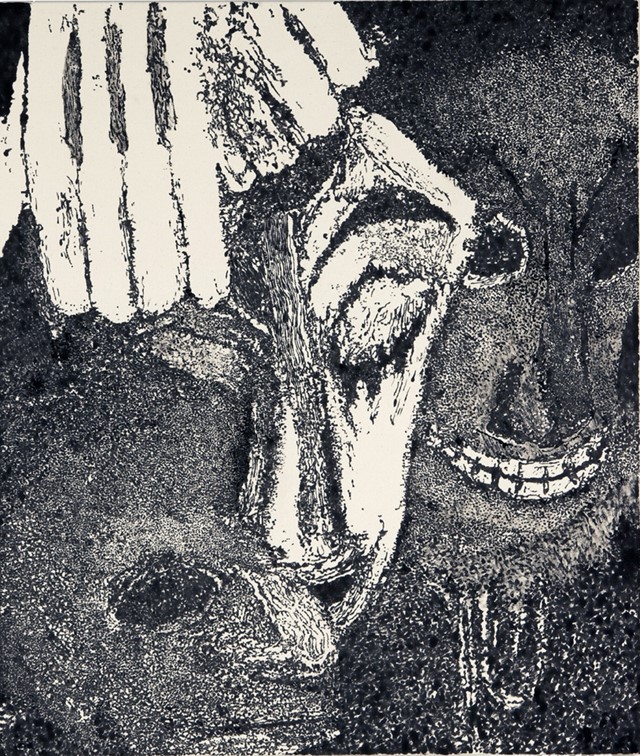Nate Lowman is an iconic figure in the younger New York art scene. A leading painter and sculptor, he has been associated with his friends Dan Colen and Dash Snow, before paving his own creative way...
Nate Lowman is an iconic figure in the younger New York art scene. A leading painter and sculptor, he has been associated with his friends Dan Colen and Dash Snow, before paving his own creative way. In 2011, an exhibition at the American Academy in Rome, Three Amigos, featured their deep friendship. After his breakthrough came in 2005, when his work was included in Greater New York at MoMA/PS1, his work has been exhibited in numerous venues, such as, in 2009, at the Astrup Fearnley Museet for Moderne Kunst in Oslo and at the Hydra Workshop, at Maccarone in 2009, at Maccarone and Gavin Brown’s Enterprise in 2011, and at Massimo De Carlo in 2012. In 2007, alongside with Adam McEwen, he co-curated the now legendary show Beneath the Underdog, at the Gagosian Gallery in New York.
How would you connect fashion to elegance?
I do not connect fashion to elegance. Elegance is in the wilderness, and fashion is in the domestic.
What is the role of history and art history in your conception of fashion?
The only thing that pops to my mind is this picture in the great Richard Prince book Adult Comedy Action Drama of a model wearing a Burberry coat, or something, standing in front of a Christopher Wool text painting, looking over. He re-photographed it from a magazine, with the wrong kind of film, so the light’s all blue, and that’s art history, history and fashion.
Would you describe fashion as a language and a discourse, as Barthes did?
I’m from Las Vegas, I might as well be Roland Barthes! Who’s afraid of Roland Barthes? Absolutely, fashion is a discourse. He probably legitimated fashion as a discourse, and after he did it, it now seems obvious. Architecture is a discourse, everything is a discourse. Fashion discourse is actually a micro-discourse, because it’s centered around the body. It is the most rapidly developing form of discourse. Basically, it’s like slang: it’s variations upon small parts of a language.
The word 'intellectual' was coined in a time of great political distress. Does fashion have a political role? And in which way?
When you mix fashion and politics, you get fascism. Politics have fashion, and it’s bad; fashion has politics, that are ugly. The best political fashion is the worse political ideology – it’s like nazi boots, totally fucked-up.
"When you mix fashion and politics, you get fascism. Politics have fashion, and it’s bad; fashion has politics, that are ugly. The best political fashion is the worse political ideology – it’s like nazi boots, totally fucked-up."
What does fashion have to do with intellectuality?
Fashion is about order, good ideas always begin wild. But like we said, fashion has language. You can get structure to a wild idea, and that enables you to communicate. It works in art, but in fashion, that’s the rule.
How would you relate the concept of 'fashion' to the one of 'style'?
I think that fashion is industrial, whereas style is ideological. So they’re not necessarily connected.
Your work is filled with references to culture at large. What is the situation of fashion inside of culture at large?
There’s this quote by a noise-musician called Boyd Rice, who also recorded music under the name Non: "Christ will come and Christ will go, but Caesar will live forever." When I think of fashion, I always think of that quote, because you say, "it’s old-fashioned", or "it’s in fashion", or "it’s out of fashion". So fashion is an industry, but it’s also a situation. In the grandiose term, a Zeitgeist, or something. It’s about relativity. It’s a marker, and a dead end, at the same time. You get in, you stay there for a while, and then you have to get out and do something else.
More and more, fashion and art seem to merge into one unique form. As an artist, how do you feel about that?
Maybe it’s not true, because of the industrial realities of the businesses that they’re becoming, that they’re merging. They can’t, because of how business is done in both fields. As they say: dress for success.
In two weeks Donatien will be interviewing the muse, editor and fashion icon Carine Roitfeld.
